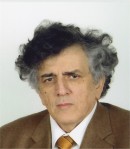|
Plenary
Lecture
Variational Treatment of Screened Coulomb Potentials:
The Yukawa Potential

Professor N. A. Baykara
Marmara University
Mathematics Department
Istanbul, TURKEY
E-mail:
nabaykara@gmail.com
Abstract: The most fundamental equation of
Theoretical Chemistry and of Atomic Physics is the
Schroedinger equation for a hydrogen like system. Its
solution can be found in any standard textbook on Atomic
Physics, Quantum Chemistry and so on. A similar equation
which is somewhat more complicated is the Schroedinger
equation for a particle bound in what is known in the
literature as screened Coulomb potential. The screening
function that will be discussed is one which is solely
dependent on the radial variable r and is known in the
literature as the Yukawa potential. This potential
arises naturally as the position space version of the
solution of the Klein-Gordon equation for a static meson
field. It was the deuteron problem which inspired the
first solutions to the corresponding eigenvalue
equation. It is commonly known in plasma physics as the
“Debye-Hueckel” potential and represents the effect of
the plasma sea on localized two-particle interactions.
The Debye-Hueckel potential also approximates the
Thomas-Fermi potential in the calculation of the
energy levels of the impurity centers in doped
semiconductors. Together with the Hulten and the
exponential potentials the Yukawa potential plays an
important role as a good test case in potential
scattering studies also. In quantum chemistry the effect
of the core electrons on the valence electrons can be
modeled by means of a linear combination of Yukawa or
similar potentials. Various approaches have been made to
attempt to solve the eigenvalue problem associated to
the corresponding Schroedinger equation having Yukawa or
similar screened coulomb potentials. Quite a few of
these use perturbational and variational techniques.
There were also group theoretical approaches. Direct
numerical integration of the corresponding Schroedinger equation were also employed and quite
succesfully so. Regge trajectories were determined via
this means or by utilizing continued fractions. There
are of course plenty of other works related to Yukawa
potential. The method that will be discussed during the
talk is also based on variational treatment of the
radial Schroedinger equation with Yukawa potential. It
employs a Laguerre basis set extended by an extra
function. A parameter used in this extra function and
its relation with the energy of the system results in
the utilization of an auto-coherent (or self-consistent)
scheme. The proposed method does not only give energy
values for the ground and the first few excited states
consistently up to thirty digits but also gives
threshold screening parameter values accurate to 15-20
decimal points.
Brief Biography of the Speaker:
N. A. BAYKARA was born in Istanbul,Turkey on 29th July
1948. He received a B.Sc. degree in Chemistry from
Bosphorous University in 1972. He obtained his PhD from
Salford University, Greater Manchester, Lancashire,U.K.
in 1977 with a thesis entitled “Studies in Self
Consistent Field Molecular Orbital Theory”, Between the
years 1977–1981 and 1985–1990 he worked as a research
scientist in the Applied Maths Department of The
Scientific Research Council of Turkey. During the years
1981-1985 he did postdoctoral research in the Chemistry
Department of Montreal University, Quebec, Canada. Since
1990 he is employed as a Staff member of Marmara
University. He is now a Full Professor of Applied
Mathematics mainly teaching Numerical Analysis courses
and is involved in HDMR research and is a member of
Group for Science and Methods of Computing in
Informatics Institute of Istanbul Technical University.
Other research interests of his for him are “Density
Functional Theory” and “Fluctuationlessness Theorem and
its Applications” which he is actually involved in. Most
recent of his concerns is focused at efficient remainder
calculations of Taylor expansion via Fluctuation–Free
Integration, and Fluctuation–Free Expectation Value
Dynamics.
|
